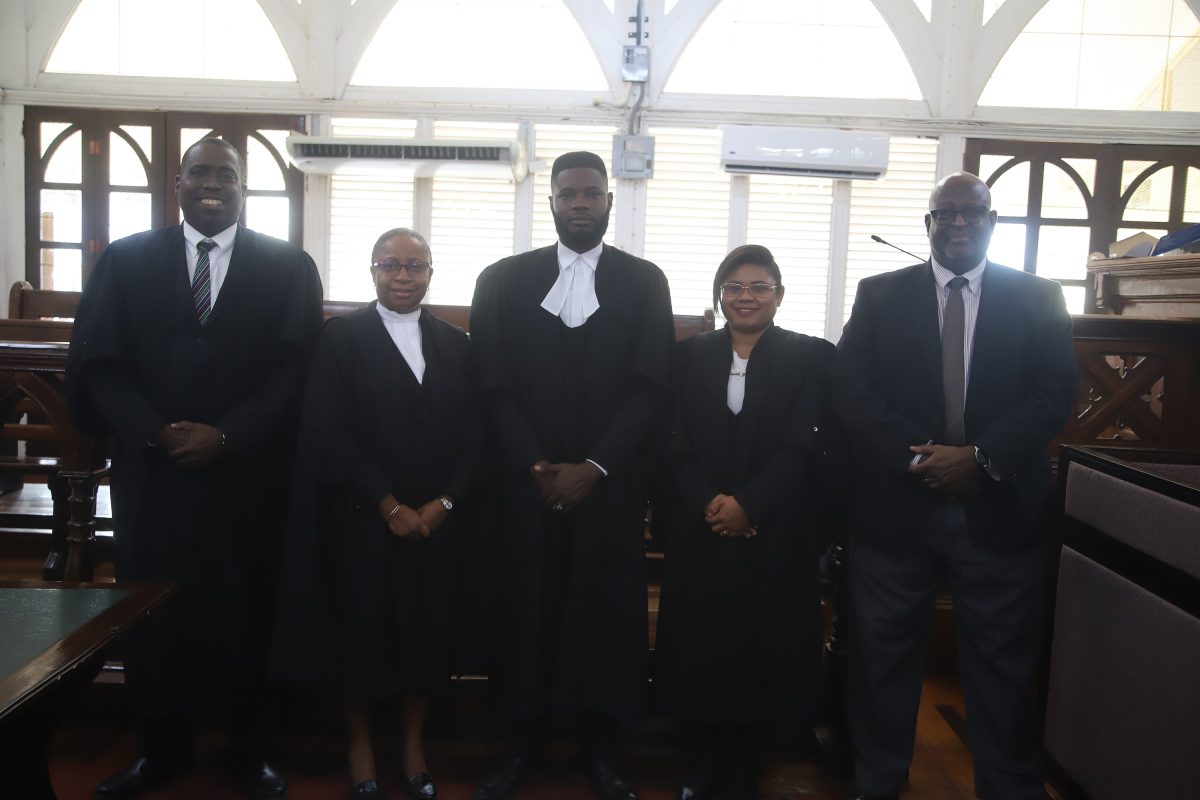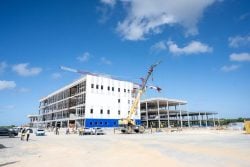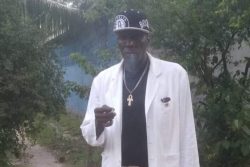Chevy Devonish, the valedictorian of the 2019 graduating class of the Hugh Wooding Law School (HWLS), was admitted to practice law in Guyana on Tuesday.
Devonish’s petition was presented by Senior Counsel Stephen Fraser and heard by Chief Justice Roxane George.
Devonish, 31, is currently a reporter at Stabroek News and also a lecturer at the University of Guyana, where he teaches in the Law Department and the Department of Government and International Affairs.
He told Stabroek News that he returned to the media after graduating as he wanted to use some of what he has learned over the last five years of formal legal education to write on issues pertaining to corruption, the environment, human rights, and the judiciary.
He further stated that he is not certain when he will place both legs completely in legal practice, as he derives satisfaction from his current undertakings. Devonish also mentioned that the exposure he gets from being part of the media corps helps him to bring live, relevant examples to his classrooms.
Devonish grew up in Georgetown, but spent sizeable portions of his childhood days in Berbice, Linden and the Linden Highway, where his father, Huborn Devonish, a former police officer, was stationed.
He attended the St. Agnes Primary School before attending the Central High School from 2000 to 2006. Devonish spent six years at Central, as he repeated the third form. According to Devonish, he failed third form a second time, but was put over into fourth form due to the now discontinued “no child left behind” policy.
Devonish began pursuing a Bachelor’s Degree in International Relations in 2006, and graduated in 2010. He started tutoring two courses at UG, Introduction to the Theory and Practice of Politics, and Introduction to Political Structures and Institutions, in 2011. In 2012, he began to work as a reporter at Stabroek News, where he worked full-time, while continuing to tutor at UG.
Devonish says that his exposure to Guyana’s political system through his exploits as a reporter prompted him to pursue an LL.B, as he believed this would enable him to better understand and write on the topics he was charged with covering, while better holding public authorities accountable.
Devonish, therefore, left full-time reporting at Stabroek News in 2014 to commence LL.B studies at UG. He recalled that it was a difficult decision, especially financially, as aside from himself, his mother, Roxanne Devonish, was the only place he could turn for financial assistance. This did not deter Devonish, however, who took a loan and commenced his LL.B studies.
He recalled that while he would eventually pay cash for his remaining two years, he almost dropped out of the programme on two occasions owing to financial limitations.
Devonish served as class representative during the entirety of the three-year programme, and was elected President of the University of Guyana Law Society (UGLS) for two consecutive terms.
He also piloted the UGLS high school outreach initiative, through which LL.B students engaged students studying sixth-form law to assist their matriculation into the LL.B programme, and functioned as Secretary to the UGLS constitutional reform committee.
Devonish shared that fortune smiled on him while in his second year in UG’s LL.B programme, as he was recommended by his Public International Law lecturer, Professor Duke Pollard, to work as a research assistant on the Steering Committee on Constitutional Reform, which was headed by attorney Nigel Hughes.
He explained that while working for this committee, he met Fraser, who invited him to intern for the firm he managed, Fraser, Housty & Yearwood, Attorneys-at-Law, now Fraser & Housty, Attorneys-at-Law. Devonish interned at the firm throughout his third-year at UG, all while still tutoring at the university.
He shared that much of the work he was given was new and intimidating but noted that he always put his head down and tried to do his best. He admitted that he sometimes made mistakes, which was sometimes met with expressions of disappointment. He, however, said that he used even the occasions of mistakes to improve himself.
Due to the plethora of activities he was engaged in during his final year, he was pleasantly surprised to find that he would be graduating with a Grade Point Average of 3.4 (Distinction).
Having been one of the top 25 graduates, Devonish gained automatic entry into the HWLS, and was only able to attend on the strength of sponsorship by the firm he interned with. Devonish said “when the offer was made, I wanted to say yes right away. It was Mr. Fraser, who, being more experienced and wise, told me to consider the opportunity, and then give the firm an answer. I tried as much as possible to keep a straight face after that, and not let my excitement be revealed. I am sure I failed.”
Unprecedented challenges
Devonish thus was able to enroll in the HWLS in 2017, but it was not smooth sailing. Devonish became ill in March 2018, and underwent a surgical procedure while in Trinidad. He said that “while living in Trinidad brought peculiar challenges, living in Trinidad after surgery presented unprecedented challenges.” He said, however, that with the support of regional and Guyanese schoolmates, he was able to recover sufficiently in time to sit exams in May.
But this was not the end of Devonish’s misfortune. He shared that certain challenges caused medical complications once more in 2019, which resulted in him being hospitalised briefly. This time, Devonish did not recover in time to sit exams in May, but was allowed to take him exams in August. “Some of my colleagues thought that I was fortunate to have an additional three or so months to study for examinations. But it was incredibly difficult to resurrect the ‘exam mode’ which died off in May, and maintain that from June to August. By the time the exams came around, I was ready to be done with them.”
He also said that August exams are complicated because they tend to focus on areas which are not necessarily addressed with as much detail during the school year, and that with the exception of one exam, which is held on the Friday before the others, four exams must be taken in four days, consecutively.
But Devonish’s HWLS experience was not all gloom. He said that after an unsuccessful bid to be Year Representative, he was elected Vice-President of the Students’ Representative Council (SRC) of the HWLS Student Body.
Devonish said that while serving as VP, he successfully lobbied for fixed subventions for all school bodies, with opportunities for them to benefit from additional funds. He said that he also piloted and led the implementation of the SRC LL.B Outreach Initiative, through which he led a delegation of staff and students to UG’s Department of Law, and the University of the West Indies’ Faculties of Law at Cave Hill and St. Augustine to address several issues, including assisting student to matriculate to the HWLS with added ease.
In recognition of his exploits at the HWLS, Devonish was named valedictorian of the 2019 graduating class, and awarded the Keith S. Sobion Memorial Prize for demonstrated Leadership and Initiative. Devonish was also awarded a prize for winning a national debate competition along with his teammates Kaylia Richards, and Fanella France.
Asked what he plans to do next, Devonish expressed a desire to pursue Masters Degrees in Drafting, International Human Rights Law, Maritime Law, Environmental Law, and Public International Law. He also expressed an interest in undertaking a Masters in Climate Change and Natural Resources Management. Devonish is also set on completing a PhD at some point.
Asked what advice he would give to current law students, Devonish said, “I can say many things. But I choose to say this: engage in the practice of law not solely for financial gain, but for the achievement of the object of law, that is, the better society. This approach changes how you perceive law, and how you will practice and apply it.”
He also said that “students must realise that the nobility in which the profession is steeped does not flow from and at the time of one’s admission. Instead, it flows from the practice of the law in accordance with the principles and code of ethics which set the parameters in which we operate.”






